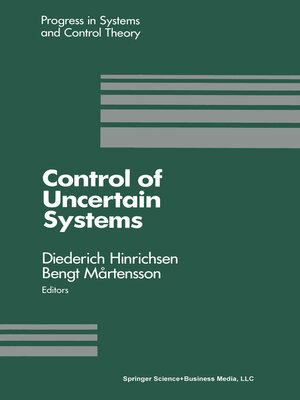Control of Uncertain Systems
ebook ∣ Proceedings of an International Workshop Bremen, West Germany, June 1989 · Progress in Systems and Control Theory
By Hinrichsen

Sign up to save your library
With an OverDrive account, you can save your favorite libraries for at-a-glance information about availability. Find out more about OverDrive accounts.
Find this title in Libby, the library reading app by OverDrive.



Search for a digital library with this title
Title found at these libraries:
| Library Name | Distance |
|---|---|
| Loading... |
Invoking the machinery of Control Theory to control a real-world plant means, on the basis of available a priori knowledge of the plant, design ing/selecting a feasible controller accomplishing the control objective. A priori knowledge about the plant is normally represented as a mathemat ical model, given by physical laws or measurement data. Such a model is inevitably uncertain, due to measurement errors, simplified models of natural laws, neglected dynamics, and the desire to get a model tractable for further computations. Control of Uncertain Systems is therefore an im portant issue, both practically and philosophically. Basically, two different approaches exist: Adaptive Control and Robust Control. On four beautiful summer days in June 1989, researchers from 12 coun tries gathered together in Bremen, West Germany, for a workshop devoted to these issues. 49 talks, invited and contributed, were presented. The present work collects 18 of these talks. (Program and original abstracts from the workshop are available as Report 209, Institute for Dynamical System.) The papers represent a broad scope of current trends in robust and adaptive control. Topics covered include: New directions in adaptive control, stability analysis of uncertain systems, robust and adaptive stabi lization, numerical methods, and topological aspects of robust control. The papers were carefully refereed and we would like to thank the referees for their efforts, which have resulted in substantial improvements.







